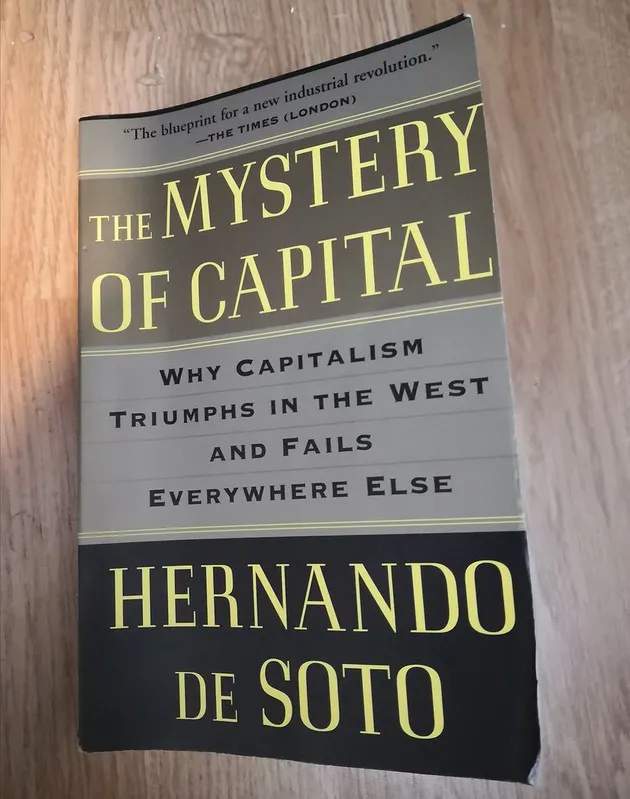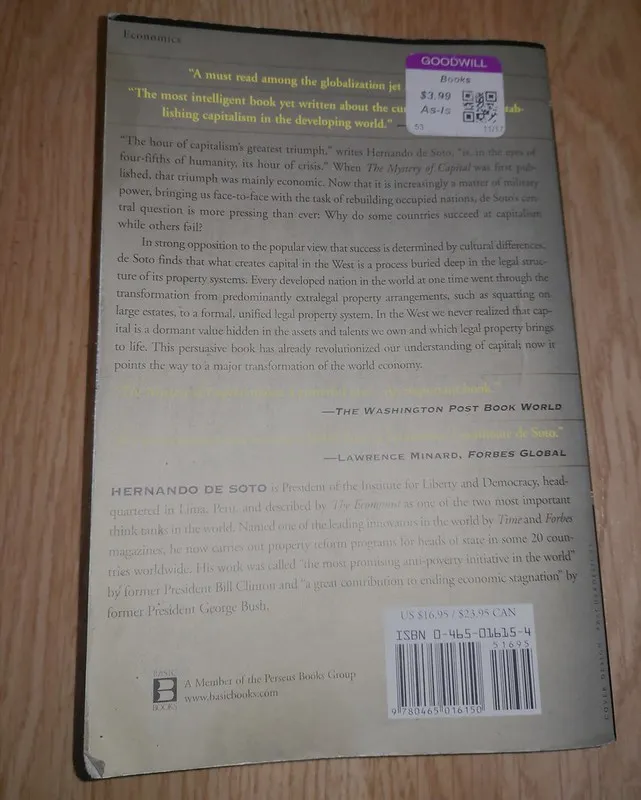Intro
On my daily walks, I often stop at the local Goodwill thrift store to shop for used books. I do own a kindle, but there's something about turning actual pages and having one less screen to stare at that is appealing to me.
The Book
The Mystery of Capital - Why Capitalism Triumphs In The West And Fails Everywhere Else by Hernando De Soto.
 |  |
About The Author
Hernando De Soto is president of the Institute for Liberty and Democracy (ILD), located in Lima, Peru. In that role, Mr. De Soto works with developing countries to implement property and business rights reforms that provide the legal tools and institutions required for citizens to participate in the formal national and global economy. [src]
About The Book
The book I found was a first edition printed in 2000.
The author described a lack of property rights as a fundamental reason capitalism fails in places besides western countries. This lack of property rights stems from a government's inability to document and enforce ownership of property. Without this enforcement of property rights, owned property cannot be brought to bear as working capital for conducting business, and without working capital, you have no capitalism.
Premise Of The Book
From the cover:
In strong opposition to the popular view that success is determined by cultural differences, de Soto finds that it actually has everything to do with the legal structure of property and property rights. Every developed nation in the world at one time went through the transformation from predominantly extralegal property arrangements, such as squatting on large estates, to a formal, unified legal property system. In the West we've forgotten that creating this system is what allowed people everywhere to leverage property into wealth.
In his book De Soto describes the five mysteries of capital as reasons why capitalism fails in non-western countries. They are:
Mystery Of Missing Information
- You cannot have capital formation without formal systems to track private property, and clear laws and procedures to protect it. To put it simply, it's the ability to legally prove ownership, so that ownership can be leveraged as capital. While people may have physical possession of property, without proper systems in place, it is considered dead capital.
Mystery Of Capital
- The concept of capital is often a misunderstood one. The author describes it as a virtual representation of physical property. That virtual representation can be leveraged as capital. For example, property that can be used as collateral for a mortgage. Without a universally recognized virtual representation of property, it is very difficult to utilize that property as capital.
Mystery Of Political Awareness
- In his book De Soto references the concept of the "Bell Jar" created by the French Historian Fernand Braudel. People inside the Bell Jar, such as elites in the poorest of nations have access to capital, while the poor remain outside the Bell Jar looking in. He concludes that politicians in these countries should make the Bell Jar as inclusive as possible if they wish to maintain a vibrant capitalistic economy.
Missing Lessons Of US History
- For this subject, De Soto provides examples from American history of how the property system evolved on its own to foster easier access to capital and rapid expansion
Mystery Of Legal Failure
- The primary challenge involves bringing extralegal property holders under the legal umbrella, so their property can be legally used as capital.
Relevance To Today
A full 20 years later, it is difficult for me to say if the anecdotes the author used are as relevant today. These included issues with property rights in countries such as The Philippines, Egypt, Haiti, Peru, and Brazil. That said, I think it would be easy to assume that these same issues exist today elsewhere in the world as well. Despite the book's age, it is an excellent source of information if you are looking for potential uses of blockchain, without ever actually mentioning it.
My Thoughts
I'm not sure that blockchain is a panacea for all the world's problems, but this book sure seems like a cry for immutable distributed ledgers almost a decade before Bitcoin was born. Poor countries that cannot afford expensive integrated systems to aid in documenting and enforcing property rights, can simply store their property records on a public blockchain, and potentially enforce agreements using smart contracts. If records related to property can exist on public blockchains, it could transcend the property rights limitations that exist is some of the poorest countries, and/or those with the most corrupt governments.
Conclusion
It's not very often I start reading a book and have an ah-ha moment within reading the first chapter. Throughout this book, I found myself repeating a mantra of: "Blockchain could fix that". After reading it, I found myself wondering if De Soto had considered blockchain as a solution to some of these problems. It turns out, De Soto and ILD were asking if blockchain could be applied to these problems as early as 2015, when he attended the 1st annual Blockchain Summit. [src] It will be exciting to see what the future holds for international property rights, and how blockchain, tokenization, smart contracts, and cryptocurrency will fit into it.
Thanks for reading! Do you feel optimistic about the potential for blockchain to solve some of the world's property rights challenges?

